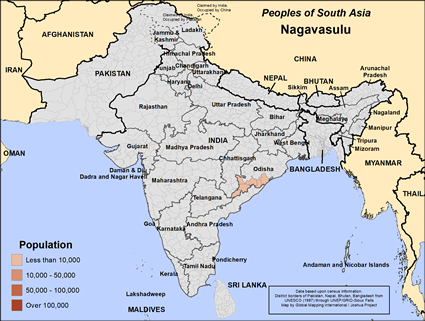The Hindu Nagavasulu people live in Odisha, India, primarily in rural areas where agriculture forms the backbone of their livelihood. Historically, the Nagavasulu people have relied on farming and animal husbandry to sustain their communities. Over time, they have adapted to changes in the region's economy, though many still practice traditional forms of agriculture, deeply rooted in the region's landscape and seasonal cycles.
The Nagavasulu people primarily work as farmers, cultivating crops such as rice, millet and pulses. Their agricultural practices follow the monsoon cycles, with families working together during planting and harvest seasons. Many Nagavasulu families also rear livestock, including cattle and goats, which provide additional income and food security.
In their villages, the Nagavasulu people live in close-knit communities, with extended families residing nearby. Homes are typically built from locally available materials such as mud, brick and thatch. Daily life centers around farming activities, family responsibilities and religious observances. Though younger members of the community increasingly seek education and work in nearby towns, many continue to live in rural areas, maintaining their connection to the land.
The Nagavasulu people practice Hinduism, observing traditional religious rituals and festivals. They worship major Hindu deities like Vishnu, Shiva and Durga and also honor local gods and goddesses associated with nature and agriculture. Festivals such as Diwali, Holi and Rath Yatra hold special significance, with the community gathering to offer prayers and perform rituals for good harvests and protection.
Temples and shrines play an important role in their religious practices, serving as central locations for worship and community events. The Nagavasulu people's religious life often reflects their dependence on the land, with many rituals aimed at seeking blessings for their crops and livestock.
The Nagavasulu people face several challenges, particularly in terms of economic development, education and healthcare. Many still rely on traditional farming methods, which makes them vulnerable to environmental changes such as droughts or floods. Access to modern farming techniques, irrigation systems and sustainable agricultural practices would help improve their productivity and resilience.
Education is another critical need in Nagavasulu communities, as access to quality schools is limited, especially in rural areas. Expanding educational opportunities would provide younger generations with better prospects for employment and upward mobility. Healthcare services are also scarce, with many families having to travel long distances to reach medical facilities. Improving healthcare infrastructure in rural areas would greatly benefit the community.
Pray that the Holy Spirit would be opening and preparing their hearts to receive the gospel.
Pray for the Lord to reveal himself as savior and friend to the Nagavasulu people.
Pray for laborers to be sent to these people with a passion to see them come to salvation in Christ.
Pray that they would not see Christianity as an outside movement or religion, but they would see salvation as God's redemption plan that he's offered all along.
Pray for discipleship communities to grow and thrive among the Nagavasulu people.
Scripture Prayers for the Nagavasulu in India.
Ethnologue: Languages of the World
Reports from Indian NGOs on rural communities in Odisha
Academic research on agricultural practices and rural development in eastern India
| Profile Source: Joshua Project |











